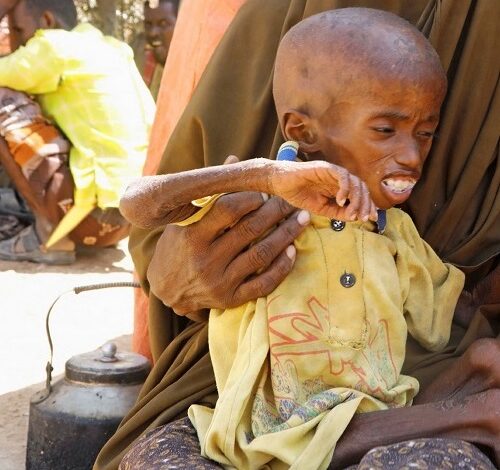
The Horn of Africa region is facing the driest conditions in more than four decades after three consecutive failed rainy seasons, according to the United Nations’ World Food Program (WFP).
More than four million Somalis will struggle to find food if the rains don’t come in April, WFP said.
Somalia has experienced a series of catastrophic droughts in the last decade.
Global weather patterns indicate that the rains are likely to fail again this year, according to the Famine Early Warning System Network (FEWS Net), which has warned that the region could experience its worst drought on record.
“These people have lost everything,” said El-Khidir Daloum Mahmoud, WFP’s country director. “Human suffering is human suffering, no matter whether it is in Europe or Africa or Asia or anywhere… we have a crisis in the making.”
If this year’s rains do not materialise, 1.4 million children under five will be acutely malnourished by the end of the year, a WFP spokesperson said.
Earlier this month, the United Nations (U.N.)’s Intergovernmental Panel on Climate Change, the top global climate science authority, said heatwaves, droughts and extreme rainfall would become more frequent in coming decades as temperatures continued to climb.
For climate scientists reviewing a Pacific Ocean temperature forecast map in November, a bright red, sideways “V”, thousands of kilometres long signalled disaster.
Combined with La Nina cooling in the central and eastern Pacific, the V-shaped pattern of warm sea water stretching from Australia’s east coast to the Philippines and back over the ocean north of Hawaii, indicated that halfway around the world in the Horn of Africa, the upcoming March-May rainy season would likely fail.
The scientists’ organisation, called Famine Early Warning System Network or FEWS Net, sent out an alert, with U.N., European Union (EU) and African institutions saying the “unprecedented” drought would likely “cause a perilous and disruptive humanitarian disaster”.
If the warning is borne out, it could push the region into its worst drought on record. Millions of people would struggle to feed themselves.
Such warning systems were becoming increasingly essential as climate change puts food security at increasing risk. “Our work is to save lives and livelihoods,” said FEWS Net agricultural meteorologist, Gideon Galu, in Kenya. -Reuters






